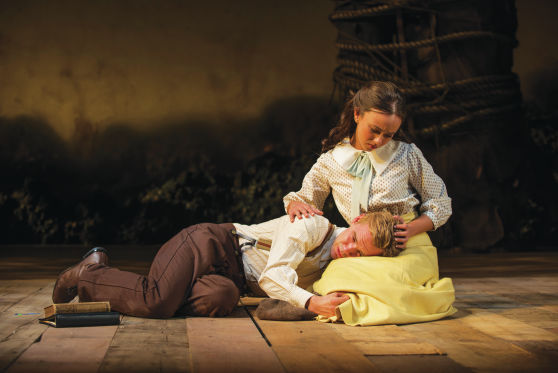
John Steinbeck's novel, “East of Eden,” reads like classical tragedy, its sweeping narrative arc spanning multiple generations suffering under nemesis of uncertain origin. Their trials are not the handiwork of the gods, though—our setting is the midland region of California in 1900, after all, where destinies are shaped by biological imperative and psychological compulsion more than divine whim.
After bypassing backstory acquainting us with the Trask brothers of New England and a battered young woman abandoned on their doorstep, our tale commences with Adam Trask wedded to the derelict waif and vowing to shelter her within a pastoral paradise in the fertile Salinas Valley. Alack, his tenacious bird soon flees her gilded cage, leaving him with two sons he cannot help but love unequally, following the example of his own father. When Caleb and Aron are grown, the latter becomes enamored of a neighboring girl in whom he senses the maternal affection missing from his childhood, but before history can repeat itself, the jealous Caleb intervenes, in doing so shouldering responsibility for the misfortunes of his line. Many an unhappy household, in fact and in fiction, has been founded upon a dream of perfection beyond the capacity of imperfect mortals, but playgoers may discover themselves searching in vain for a lesson to take away from a dramatic universe where the good are destroyed by their goodness and the wicked gain no pleasure from victory. At Steppenwolf, if the grandeur initially invoked by Walt Spangler's scenic design—dominated by a massive oak tree, split as if by lightning, but roped together in a stubbornly human attempt to make the damaged trunk grow together again—presages a pessimistic resolution, however, adaptor Frank Galati mitigates Old Testament justice with extensive discussion of modern concepts like "free will" and its power to liberate troubled survivors from their ancestral shackles, offering them hope for redemption. Two intermissions ensure audiences retaining their physical comfort and mental acuity over a performance time of nearly three hours, while Rob Milburn and Michael Bodeen's incidental score—rendered stageside by Kyra Saltmann on solemn cello and Ben Melsky on delicate harp—eases us into the lofty speech of heroic-proportioned characters. As in 1990's Grapes of Wrath (another Galati-Steppenwolf adaptation of a Steinbeck classic), the 10-member cast exhibits ensemble acting at its most exemplary—but look for Stephen Park to carry the day with his stereotype-free portrayal of Lee, the Trask's philosophical Chinese major-domo, whose significance gradually blossoms from that of humble servant to nothing less than the conscience of full-blown epic myth.
